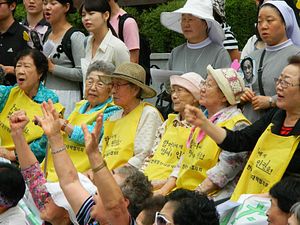Following Prime Minister Shinzo Abe and President Park Geun-hye’s first face-to-face meeting at the Nuclear Security Summit in the Hague last month, South Korea and Japan appear to be addressing at least one source of tension in the bilateral relationship. On Wednesday, the two countries agreed to hold high-level talks on the Japanese imperial army’s sexual enslavement of Korean “comfort women” during World War II. This will be the first diplomatic channel between the two countries since the end of the Second World War to be focused solely on the contentious diplomatic issue that has pained South Korea for decades.
The move comes amid concerns in South Korea and Japan that Shinzo Abe’s administration would revise or retract the Kono Statement, issued by Chief Cabinet Secretary Yohei Kono in 1993, that acknowledged the Japanese imperial army’s transgressions in Korea during the war.
Wednesday’s meeting involved the director generals for Northeastern Asian affairs from both Seoul and Tokyo — Lee Sang-deok and Junichi Ihara respectively. The two sides decided to set up regular monthly talks on the issue. While they have decided to meet in Tokyo in a month, a specific agenda has yet to be decided. According to a South Korean foreign ministry official, the meeting’s agenda might be expanded to include other regional issues, including North Korea.
Although the media’s reaction to this development has been somewhat muted in both countries, the development is rather significant and comes at a time when it appeared that Japan would remain diplomatically isolated as long as Shinzo Abe remained in office. Abe’s popularity in South Korea is rather low owing to his image as an ardent Japanese nationalist. His visit to Yasukuni Shrine, where Japan honors its war dead, including several class-A war criminals, in December 2013 enraged South Korea and China. The decision to hold talks also indicates an important diplomatic concession by the Japanese side, which has long claimed that any liabilities emerging from the “comfort women” issue were resolved by the 1965 treaty that normalized bilateral ties between the two countries.
Seoul’s position on the issue, however, has been that the “comfort women” issue is far from settled. Several South Korea women who were subjected to Japanese sexual enslavement during the Second World War are still alive. A few months ago, former Japanese Prime Minister Tomiichi Murayama met with these women in South Korea, calling on the Abe administration to take action on the issue. South Korea insists that the Japanese government should directly apologize to the victims and offer compensation. Seoul’s goal is to resolve the issue “effectively and in a way that is agreeable to the living victims.”
The talks will not be a panacea to the relative freeze in bilateral relations between Japan and South Korea who have hardly interacted diplomatically on a high-level over the past year. Where previous Japanese prime ministers have met the South Korean president within a year of coming to power, it took Prime Minister Shinzo Abe over a year to meet with President Park, and even then it was part of a trilateral meeting with their mutual ally, the United States.
For the United States, these talks will be a relief considering that the growing rift between Tokyo and Seoul is a major cause for concern in Washington. The United States maintains alliances with both Japan and South Korea and has been hesitant to serve as a mediator. The timing of the announcement will also allow U.S. President Barack Obama to address the development when he heads to South Korea and Japan next week.

































